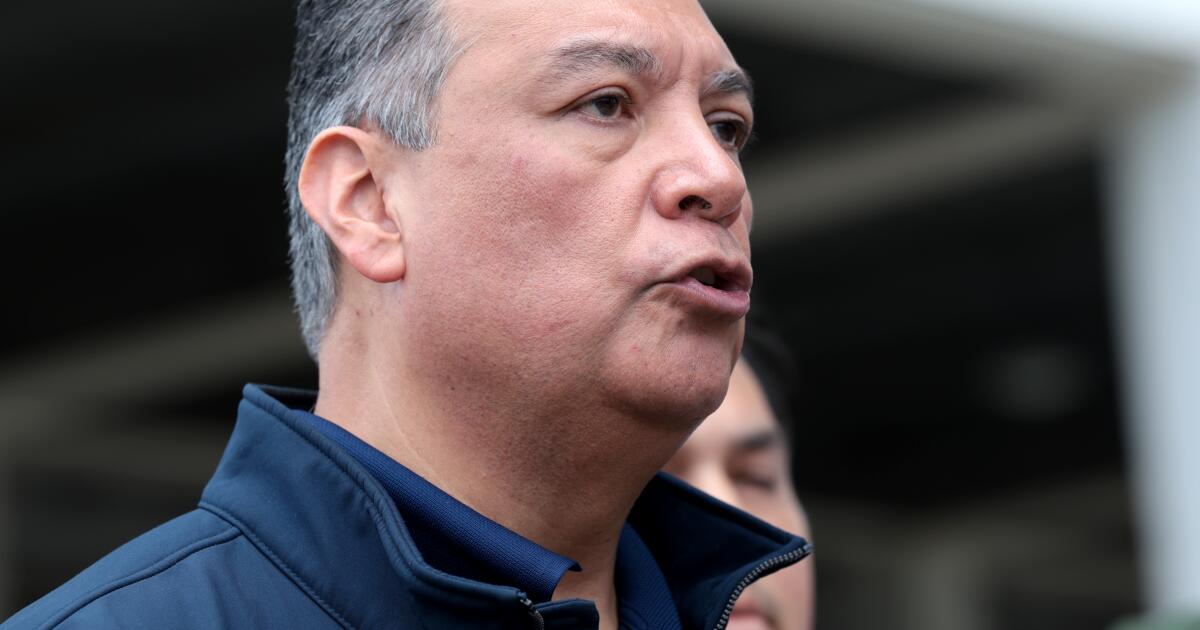Sen. Alex Padilla says he won’t run for California governor
WASHINGTON — U.S. Sen. Alex Padilla announced Tuesday that he will not run for California governor next year, ending months of speculation about the possibility of the Democrat vying to succeed Gov. Gavin Newsom.
“It is with a full heart and even more commitment than ever that I am choosing to not run for governor of California next year,” Padilla told reporters outside his Senate office in Washington.
Padilla instead said he will focus on countering President Trump’s agenda in Congress, where Democrats are currently on the minority in both the House and Senate, but hope to regain some political clout after the 2026 midterm elections.
“I choose not just to stay in the Senate. I choose to stay in this fight because the constitution is worth fighting for. Our fundamental rights are worth fighting for. Our core values are worth fighting for. The American dream is worth fighting for,” he said.
Padilla said his decision was influenced by his belief that under President Trump, “these are not normal times.”
“We deserve better than this,” he said.
Many contenders, no clear favorite
Padilla’s decision to bow out of the 2026 governor’s race will leave a prominent name out of an already crowded contest with many contenders but not a clear favorite.
For much of the year, the field was essentially frozen in place as former Vice President Kamala Harris debated whether she would run, with many donors and major endorsers staying out of the game. Harris said at the end of July that she wouldn’t run. But another potential candidate — billionaire developer Rick Caruso — remains a question mark.
Caruso said Monday night that he was still considering running for either governor or Los Angeles mayor, and will decide in the next few weeks.
“It’s a really tough decision,” Caruso said. “Within a few weeks or so, or something like that, I’ll probably have a decision made. It’s a big topic of discussion in the house with my kids and my wife.”
Major Democratic candidates include former Orange County Rep. Katie Porter, former U.S. Health and Human Services Secretary Xavier Becerra, former Los Angeles Mayor Antonio Villaraigosa, current California Supt. of Public Instruction Tony Thurmond, former state Controller Betty Yee and wealthy businessman Stephen Cloobeck. Riverside County Sheriff Chad Bianco and conservative commentator Steve Hilton are the most prominent Republicans running.
Amid fire recovery aftermath, immigration raids and a high-octane redistricting battle, California voters have yet to turn their attention to next year’s gubernatorial matchup, despite the vast power Newsom’s successor will wield. California is now the world’s fourth-largest economy, and policy decisions in the Golden State often have global repercussions. Newsom is nearing the end of his second and final term.
Recent polling shows the contest as wide open, with nearly 4 in 10 voters surveyed saying they are undecided, though Porter had a slight edge as the top choice in the poll. She and Bianco were the only candidates whose support cracked the double digits.
Candidates still have months to file their paperwork before the June 2 primary to replace Newsom.
June incident brought attention
Known for soft-spoken confidence and a lack of bombast, Padilla’s public profile soared in June after he found himself cuffed by federal agents, at the center of a staggering viral moment during a news conference by Homeland Security Secretary Kristi Noem.
Despite identifying himself, Padilla was tackled after trying to interrupt Noem with a question. The manhandling of California’s senior senator was filmed by a staffer and broadcast around the world, provoking searing and widespread condemnation.
Days later, Vice President JD Vance joked about the incident and referred to Padilla — his former Senate colleague — as “Jose Padilla,” a misnaming that Padilla suggested was intentional and others characterized as racist.
The event put Padilla on the national spotlight and rumors of Padilla’s interest in the gubernatorial race ignited in late August.
Padilla told reporters on Tuesday that he received an “outpouring of encouragement and offers of support for the idea” of his candidacy and that he had “taken it to heart”
Alongside his wife, Angela, the senator said he also heard from many people urging him to keep his fight going in Washington.
“Countless Californians have urged me to do everything i could to protect California and the American Dream from a vindictive president who seems hell bent on raising costs for working families, rolling back environmental protections, cutting access to healthcare, jeopardizing reproductive rights and more,” he said.
Padilla said he had listened.
“I will continue to thank them and honor their support by continuing to work together for a better future,” he said.
Ceballos reported from Washington, Wick from Los Angeles. Times staff writer Noah Goldberg, in Los Angeles, contributed to this report.
